Piercings are a quick way to change your look, and they're fun and easy to get. But they also require diligent care to prevent complications such as infection. You might think powerful cleansers such as isopropyl alcohol or hydrogen peroxide would be best to keep the germs away from your new earrings, but they actually can do more harm than good. When caring for your new piercings, it's best to use warm water, saline solution or a gentle medicated cleanser.
Getting Your Piercing
You should have a professional pierce your ears. Boutiques and piercing studios do this every day, so they know how to minimize the chance of infection. Getting pierced at a professional studio costs more, but it's far less risky than having a friend do your piercings or doing the job yourself.
What To Use
Avoid harsh cleansers. Alcohol and hydrogen peroxide will kill germs, but they will dry the skin and can damage cells that are trying to heal the wound. This can make the healing process longer. Instead, clean the piercing twice a day with medicated cleanser or a saline solution. Rinse the piercing with warm water, use a cotton swab to remove any crusty substance (this is a normal byproduct of healing), and use a clean cotton swab to apply the cleanser thoroughly to the wound and the earring. Rotate the piercing a few times to prevent the healing from attaching to the earring.
Making the Saline Solution
Use saline solution for an ideal cleaning; piercing experts say it's the best thing you can do. To make the solution, pour a cup of bottled water into a sterilized container (you can do this with a weak bleach solution) and add a quarter teaspoon of sea salt. Change the solution every week, keep a lid on it, and use a new cotton swab every time.
Related Articles
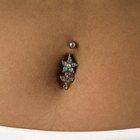
How to Swim With a New Belly Button Ring

Homemade Recipe to Disinfect a Piercing
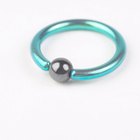
How to Clean Your New (Conch) Ear ...
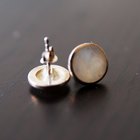
How to Sanitize Earrings

How Long Do You Keep Your Earrings in ...

How to Gauge the Ears Right After the ...
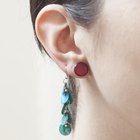
How to Change Pierced Earrings

How to Clean Smiley Piercings

Reactions to Nose Piercings
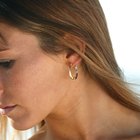
How Long After Piercing Can You Wear ...

How to Soothe an Irritated Piercing

How to Drain a Cheek Piercing

How to Prepare for a Nose Piercing

How to Clean Nose Rings
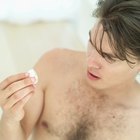
Taking Care of Gauged Ears

Facts on Nose Piercings

How to Clean a Cartilage Piercing
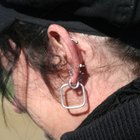
How to Gauge Your Ears with Tapers

How to Clean a Tongue Ring

How to Stop Pierced Ears From Seeping
References
Writer Bio
John Zaremba began writing professionally in 1997. He has worked at some of the country's finest small daily newspapers, including "The Beacon News" and "The Patriot Ledger." Zaremba is a graduate of the University of Illinois.